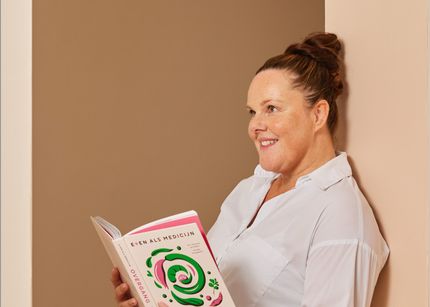Ear ringing and menopause
It's not uncommon for women to develop tinnitus (ringing in the ears) as they approach menopause. Do you hear a constant ringing, buzzing or whistling noise – but no one else hears it? You may have an audiological and neurological condition called tinnitus. It can – literally – throw you off balance, especially if the noise is constant. Tinnitus may be triggered by changing levels of hormones around menopause. Why is that? And more importantly, is there anything you can do to stop it?

I have a constant ringing in my ear. Some days are worse than others. On bad days I can hear it over everything. – Anne (age 52)

Tinnitus affects both men and women – approximately 740 million adults globally. Although more research still needs to be done on the topic, studies indicate that hormonal fluctuations may contribute to tinnitus during menopause.
Meta-analysis has shown that the prevalence of chronic tinnitus increases with age. As you age, structures inside the ear and their functions decline. Some women find tinnitus starts or gets worse when they enter perimenopause or are menopausal. The symptoms may improve in postmenopause, when hormone levels are stable and consistently low.
What is happening in your body?
In the years leading up to menopause, your ovaries gradually produce less oestrogen and progesterone. Fluctuations are most dramatic during perimenopause, the first stage of menopause. Sex hormones play a crucial role in sexual development and reproduction. But they also have profound effects on the nervous system and blood flow. Scientists don't yet know if tinnitus is directly caused by menopause. But hormonal fluctuations are believed to be a major contributor.
Research suggests that changes in oestrogen levels may alter blood flow to the inner ear. Without a healthy blood flow, the auditory system may be more vulnerable to damage, which can contribute to the development of tinnitus. During menopause, as oestrogen levels naturally decrease, the mucous membranes in the body can become dry, including those in the ears. These changes can alter the perception of sound. Tinnitus can manifest as a constant buzzing or ringing, or as a beeping, rumbling or throbbing sound. Fatigue or stress can be a trigger for tinnitus, or make it worse. Tinnitus can also cause dizziness, make you more sensitive to certain sounds or occur in combination with mild hearing loss.
Other factors
It is common for existing tinnitus to become worse during periods of stress or fatigue. In the years leading up to menopause, cortisol levels rise among some women due to hormonal fluctuations. The stress hormone cortisol, which is also released in response to acute stress, also known as the fight-or-flight response, influences blood pressure and blood flow. This, too, can make tinnitus worse.
Poor sleep is also a contributory factor. Hot flashes and night sweats can disturb sleep, which in turn can affect auditory perception. If you don’t get enough sleep your brain function and ability to cope with stress are reduced. This can also exacerbate tinnitus, making the ringing or buzzing sounds more prominent. Furthermore, medical conditions like high blood pressure and ear infection can worsen tinnitus. People with tinnitus may also experience a worsening of the condition if they are being treated with HRT for a long period of time, or with antidepressants. Always discuss any side effects of medication with a doctor.
What can you do?
Menopausal tinnitus can be an annoying and distressing problem. For some people, tinnitus can be a chronic problem that lasts for years. There is no cure for tinnitus, but there are ways to reduce symptoms.
- Reduce stress. Stress is a known trigger for tinnitus. Yoga, mindfulness and meditation are proven ways to lower your cortisol levels and calm your nervous system. Learning to say no, being willing to delegate and making time in your day for rest also help to reduce stress.
- Make sleep your number one priority. Fatigue can make tinnitus symptoms more bothersome. Quality sleep helps your brain to process stimuli, increasing tinnitus tolerance. Improve your sleep hygiene, if necessary. Stick to a schedule, ensure a relaxing bedtime routine and avoid screens before bedtime.
- Avoid noisy environments. Protect your ears from loud noises which can exacerbate tinnitus, especially if you have sensitive ears. Wear earplugs or noise-cancelling headphones in noisy environments, such as concerts or festivals.
- Adjust your diet. Nutrients are important for general health and nerve function. Avoid caffeine, alcohol and sugar, as these substances can aggravate tinnitus symptoms. Foods that are rich in antioxidants, vitamins and minerals (fruit and vegetables) help support your health.
- Consider cognitive behavioural therapy (CGT). Therapy can change the way you think about your tinnitus and reduce anxiety and stress.
- Try sound therapy. Sound therapy uses calming sounds that diminish the presence of tinnitus, such as white noise or soothing music. Because the brain can only focus on one thing at a time, using sound can provide immediate relief.
- Keep a journal. Write down the circumstances when tinnitus symptoms bother you most, or least. This will help you identify any potential triggers for your tinnitus (e.g., stress, foods, drinks or sounds).
Your path to a smooth menopause starts here
Get the tools you need to navigate menopause with more ease and to educate yourself about your body. With tips and insights from experts, and relatable stories of women just like you. Press play, not pause.
What treatments can help?
Menopausal tinnitus can be annoying and distressing. For some, it can be a chronic problem. Reducing stress and being aware of triggers, such as certain foods, is an important first step in dealing with tinnitus. You could also consider taking supplements to support your health by filling nutrient gaps.
Can hormone therapy help?
Hormone replacement therapy (HRT) is recommended for treatment of vasomotor symptoms (hot flashes and night sweats), vaginal symptoms (such as vaginal dryness, itching or pain), sleep problems, and treatment and prevention of osteoporosis. HRT replaces the hormones a woman's body stops making due to menopause. Do you suffer from tinnitus as well as other menopausal symptoms? Then HRT might be an option for you.
Sources
- Jarach CM, Lugo A, Scala M, van den Brandt PA, Cederroth CR, Odone A, Garavello W, Schlee W, Langguth B, Gallus S. Global Prevalence and Incidence of Tinnitus: A Systematic Review and Meta-analysis. (2023). PMID: 35939312.
- American Tinnitus Association. Sound Therapy. https://www.ata.org/about-tinnitus/sound-therapy/
- Martinez-Devesa P, Perera R, Theodoulou M, Waddell A. (2010). Cognitive behavioural therapy for tinnitus. PMID: 20824844.
- Cima RF, Andersson G, Schmidt CJ, Henry JA. (2014). Cognitive-behavioral treatments for tinnitus: a review of the literature. PMID: 24622860.
- Chen HC, Chung CH, Chen VCF, Wang YC, Chien WC. (2018). Hormone replacement therapy decreases the risk of tinnitus in menopausal women: a nationwide study. PMID: 29731984.
- Aliyeva A, Han JS, Kim Y, Lim JH, Seo JH, Park SN. (2024). Vitamin D Deficiency as a Risk Factor of Tinnitus: An Epidemiological Study. doi:10.1177/00034894241242330
- Nocini R, Henry BM, Mattiuzzi C, Lippi G. (2023). Serum Vitamin D Concentration Is Lower in Patients with Tinnitus: A Meta-Analysis of Observational Studies. PMID: 36980345.
Tips and advice


FAQ
Can hormone therapy help with tinnitus?
There is some evidence that hormone therapy may reduce the risk of tinnitus in postmenopausal women. But there has only been limited research and the results have been conflicting. Some studies show that long-term use of HRT can trigger or worsen tinnitus symptoms. HRT is recommended for treatment of vasomotor symptoms (hot flashes and night sweats), vaginal symptoms (such as vaginal dryness, itching or pain), sleep problems, and treatment and prevention of osteoporosis. HRT can also relieve other menopausal symptoms. Your doctor can explain if HRT is an option for you. Read more about hormone therapy.
Is menopausal tinnitus permanent or temporary?
In most cases tinnitus is temporary, just like other menopausal symptoms. Once your body adjusts to a new hormonal environment and hormone levels remain at a constant low level, the symptoms usually improve. The likelihood of chronic tinnitus increases if the cause is not related to hormones.
Can tinnitus go away with medication?
No, there isn't a drug you can take for tinnitus. However, there are therapies and treatment options to manage tinnitus.












